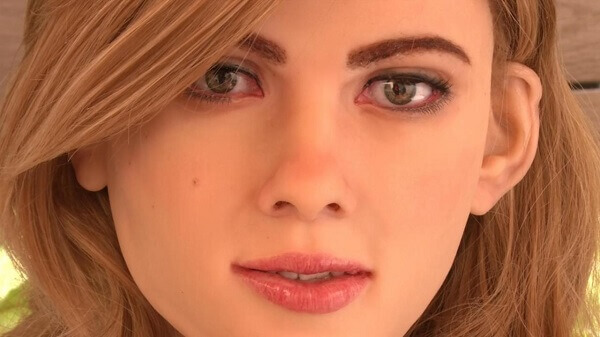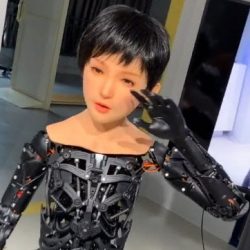Scarlett Johansson Robot Opens the Door to Celebrity Crush Replicas
Will stars sue to stop their robotic doubles from going on sale?

A Scarlett Johansson robot, based on 3D-printing technology, could be the first step toward owning a realistic replica of your celebrity crush.
Hong Kong graphic designer Ricky Ma spent about $50,000 and 18 months creating his lifelike Mark 1 robot.
Ma told news outlets that he’d based the robot on a particular Hollywood star, although he wouldn’t reveal her name.
But people quickly identified it as Scarlett Johansson, the 31-year-old star of Her, The Avengers, and Lucy, and the only celebrity to be twice named “Sexiest Woman Alive” by Esquire magazine.
Technically impressive
The Mark 1, the robotic Scarlett, has a silicone skin stretched over its 3D-printed skeleton. It can perform detailed facial expressions and respond to spoken phrases.
If a person compliments it, the robot bows, smiles, giggles, and says thank you.
Ma hopes to sell his first robot and use the funds to build more. He also wants to write a book to inspire other developers.
A Scarlett Johansson robot? No, just a robot
The significance of Ma’s robot isn’t just the technical achievement, but the idea of a celebrity crush replica. A market could even exist for celebrity sex robots.
Celebrity blowup sex dolls have existed for years, although certain “originals” have stopped them. Miley Cyrus famously threatened to sue over a blowup doll. Kim Kardashian launched a similar lawsuit in 2010.
Perhaps that’s why Ricky Ma refused to identify the Mark 1 as an imitation of Scarlett Johansson.
If Johansson could prove it was based on her, she could sue Ma for exploiting her “personality rights.”
Legal rights versus robots
The legal concept of personality rights, or publicity rights, applies in a range of countries including the U.S., Canada, China, South Africa, and Australia.
The definition varies between countries and is rarely clear cut, but fundamentally, personality rights mean that a person’s recognizable attributes can’t be exploited for a commercial purpose unless they give permission.
If Ricky Ma or anybody else tried to sell a “Scarlett Johansson robot” in the U.S., the actress could take them to court, arguing (probably successfully) they were exploiting her personality without permission to sell the robot.
Furthermore, most courts don’t limit personality rights to somebody’s name. Anything that identifies the person could apply, including their looks.
Ma might have refused to reveal the inspiration for his robot, but if the likeness is identifiably Scarlett Johansson—as it seems to be, judging by the media reaction—then personality rights could put an end to any attempt to sell the robot in the U.S.
Of course, if Johansson or any other celebrity gave approval for a robot replica, nothing could stop people getting their hands on a copy of their celebrity crush.
Laws a bigger deal for robots than dolls
If a celebrity decided to sue, they might have a better case against a robot than, for example, a blowup sex doll.
 |
If somebody built an unauthorized celebrity robot but didn’t explicitly name it, or perhaps named it just “Scarlet” rather than “Scarlett Johansson,” the legal key would be whether the robot’s appearance were identifiable as the celebrity.
Producers of a basic sex doll, identifiable mostly by hair color and body shape, could claim the resemblance was coincidental. The “Kim” doll manufacturers tried to do this, although their greatest problem was probably their doll’s “biography,” which suspiciously reflected Kim Kardashian’s life.
For most new robots, however, the standard of success is whether they’re realistic or not.
A more realistic robot would probably be more identifiable and therefore more likely to be blocked in court. To avoid a lawsuit, a celebrity robot replica would have to be obviously different from the original person, defeating the whole purpose.
Will Scarlett see red?
Johansson has previously demonstrated an appetite for litigation.
In 2015, she filed a lawsuit over a French novel called The First Thing You See. The book involves a Johansson lookalike who visits a mechanic called Arthur Dreyfuss. Arthur initially thinks the woman is the real Scarlett and treats her like that.
Johansson claimed the novel “exploited” her name, reputation, and image, as well as featured defamatory content. The judge agreed parts were defamatory—but dismissed the claims based on personality rights.
The publishers removed the defamatory parts from the book, but could still seek to translate it or even adapt it into a film.
Other celebrities might be less tempted to sue, even over a robot copy. It’s easy to imagine adult entertainers, for example, investing in robot replicas to be sold for sexual purposes.
A Scarlett Johansson robot could run into legal trouble if it flirts with commercial production, but the broader potential for celebrity crush replicas is still wide open.
Image sources: Goldene Kamera, Insider, Luke Ford
Leave a reply
You must be logged in to post a comment.

















